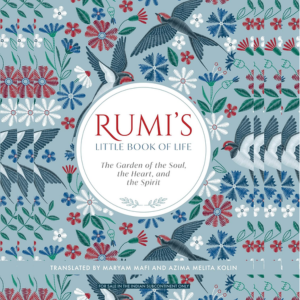Table of Contents
ToggleRumi's Little Book of Life: A Journey Through the Soul, Heart, and Spirit

Rumi’s Little Book of Life, a captivating collection of 196 mystical poems by the 13th-century Persian poet Rumi, offers profound insights into the inner journey of the soul. His words transcend religion and tradition, offering profound insights into the human experience. Translated by native Persian speakers Maryam Mafi and Azima Melita Kolin, this guidebook invites readers to explore the gardens within, transcending the mundane “world of dust.” In this blog, we will delve into the enchanting world of Rumi’s teachings, exploring the best quotes from the book and the invaluable lessons they impart.
The Essence of Rumi’s Little Book of Life
Rumi, also known as Jalāl ad-Dīn Muhammad Rūmī, has captivated hearts across centuries. His longing for union with the divine permeates every verse. In this collection, he guides us through the inner landscape, where the spirit blossoms like a fragrant flower.
The Journey Within
The World of Dust
Rumi acknowledges our earthly existence—the “world of dust.” It’s a place of transience, where we grapple with impermanence, desires, and attachments. But beyond this dust lies a hidden realm—the garden of the soul.
Ascending Hierarchy – A Guide for the Soul’s Journey
Divided into three sections – Soul, Heart, and Spirit – Rumi’s Little Book of Life is not merely a collection of poems; it’s a map for the soul’s journey. Each section builds upon the previous one, guiding the reader towards a deeper connection with their inner essence and the divine. His poetry outlines an ascending hierarchy:
- The Garden of the Soul: We begin by restoring our soul to the heart. This involves self-discovery, reflection, overcoming limitations, inner exploration and the yearning for connection with something greater. Rumi uses vivid imagery and metaphors to depict the soul as a garden, urging us to cultivate it with love, awareness, and purification.
- The Heart’s Expansion: In the second section, Rumi shifts focus to the heart. The heart becomes the vessel for deeper understanding. It connects us to the spirit, the essence of our being. Rumi portrays the heart as the seat of love, compassion, and divine connection. The poems in this section encourage the reader to open their heart to love, both for themselves and others. Rumi emphasizes the importance of letting go of negativity and embracing the transformative power of love.
- The Ocean of Spirit: The final section culminates in the vastness of the spirit. Here, we transcend all limitations. The spirit dances freely, unburdened by earthly concerns. Rumi speaks of union with the divine, the dissolution of the ego, and the attainment of true freedom. The poems in this section are infused with a sense of cosmic awareness and mystical insight.
Unveiling the Gems: Best Quotes from Rumi’s Little Book of Life
Rumi’s Little Book of Life is a treasure trove of wisdom, brimming with quotable verses that resonate with the soul. Here are a few gems to illuminate your path:
- “The breeze at dawn has secrets to tell you. Don’t go back to sleep.” This evocative line reminds us to be present and receptive to the whispers of inspiration that arise each new day.
- “Out beyond ideas of wrongdoing and rightdoing, there is a field. I’ll meet you there.” This insightful quote points towards a state of being beyond judgment, where we can connect with our authentic selves and with others.
- “Melt like snow, wash yourself from yourself, and let love grow in your soul, silent as a lily.” This beautiful metaphor encourages us to let go of egotism and allow love to blossom within us, pure and unassuming.
- “Nothing happens by chance. No one goes on a quest without a reason. Without the pull of the magnet, there is no action.” This verse reminds us of the interconnectedness of existence and the divine purpose that unfolds in our lives.
- “As long as you are crawling like a snake on this earth, do not hope to swim like a fish in the sea of Spirit.” This powerful metaphor highlights the importance of personal growth and spiritual development before reaching a state of enlightenment.
- “The wound is the place where the light enters you.”This quote reminds us that our vulnerabilities allow transformation and growth.
- “The breeze at dawn has secrets to tell you. Don’t go back to sleep.”Rumi urges us to wake up—to listen to life’s whispers and seek deeper truths.
- “What you seek is seeking you.”A comforting reminder that our desires are intertwined with destiny.
Lessons Learned: A Profound Transformation
Rumi’s Little Book of Life is not just a collection of beautiful poems; it’s a transformative experience. As you delve deeper into its verses, you gain valuable life lessons that can reshape your perspective and guide you towards a more meaningful existence.
- Embrace Impermanence: Rumi’s poems celebrate impermanence. Like petals falling from a rose, life’s moments pass. Accepting this impermanence allows us to cherish each petal.
- Nurture the Heart: The heart is our compass. Nurture it through love, compassion, and connection. Love is a central theme throughout the book. Rumi emphasizes the transformative power of love, urging us to open our hearts and cultivate compassion for ourselves and all beings. Let it guide you toward the spirit’s luminous path.
- Seek the Divine Within: Rumi invites us to seek the divine within ourselves. The spirit isn’t distant—it’s the flame that burns in our hearts.
- Embrace the Journey of Self-Discovery: Rumi encourages us to embark on a lifelong journey of self-discovery. Through introspection and self-awareness, we can cultivate our inner garden and unlock our true potential.
- Letting Go and Surrender: Rumi teaches us the importance of letting go of negativity, limitations, and the ego. By surrendering to a higher power and embracing the present moment, we can find true peace and liberation.
- The Importance of Connection: Rumi’s Little Book of Life reminds us that we are not alone on this journey. We are all interconnected with the divine and with each other. By fostering meaningful connections, we enrich our lives and contribute to a more harmonious world.
Delving Deeper: Themes and Symbolism in Rumi’s Little Book of Life
Rumi’s poetry is rich with symbolism and imagery, drawing upon nature, everyday objects, and spiritual concepts to convey profound truths. Here’s a closer look at some recurring themes and their significance:
- The Garden: The garden is a powerful symbol throughout the book. It represents the human soul, a fertile ground where love, awareness, and spiritual growth can flourish. The poems offer guidance on cultivating this garden, weeding out negativity and nurturing positive qualities.
- The Dance: Rumi frequently uses the image of the dance to depict the relationship between the soul and the divine. The dance symbolizes the ecstatic joy of connection with the divine, a state of whirling surrender to a higher power.
- The Beloved: The Beloved is a recurring figure in Rumi’s work, often representing God, the divine essence, or the ideal form of love. Yearning for the Beloved signifies the soul’s longing for connection with the divine.
- The Mirror: The mirror acts as a metaphor for self-reflection. Rumi encourages us to use the mirror of self-awareness to identify our flaws and limitations, paving the way for growth and transformation.
- The Bird: The bird symbolizes the human spirit, yearning to break free from the cage of the ego and soar towards the divine. The poems depict the bird’s journey as an allegory for the soul’s quest for liberation.
Exploring Rumi’s Legacy: A Bridge Between Cultures
Rumi’s influence extends far beyond the pages of his works. He is considered one of the greatest Sufi mystics and poets, and his teachings continue to inspire people of all faiths and backgrounds. Here’s how Rumi’s legacy continues to resonate:
- A Bridge Between Religions: Rumi’s message transcends the boundaries of religion. He speaks of a universal love and a connection with the divine that resonates with people from all walks of faith.
- A Call for Spiritual Growth: Rumi’s poems are a call to action, urging readers to embark on a journey of spiritual growth and self-discovery. His words inspire self-reflection, compassion, and a deeper connection with the divine.
- A Source of Comfort and Inspiration: Rumi’s poetry offers solace and guidance in times of hardship. His words provide comfort, hope, and inspiration for those seeking meaning and purpose in life.
- A Celebration of Love: Love is the cornerstone of Rumi’s teachings. He celebrates all forms of love – divine love, romantic love, and love for humanity. His message of love serves as a powerful antidote to hatred and division.
In Conclusion: A Transformative Journey with Rumi
Rumi’s Little Book of Life is more than just a collection of poems; it’s an invitation to embark on a transformative journey. It is not a book to be read once and put down. It’s a companion that can be revisited throughout your life, offering solace, inspiration, and guidance in times of joy and sorrow. As you delve deeper into its verses, you’ll encounter profound wisdom that can enrich your life in countless ways.
Whether you’re seeking solace, inspiration, or a deeper understanding of yourself and the world around you, Rumi’s words have the power to guide and inspire. So, open this little book, take a deep breath, and allow yourself to be swept away by the timeless beauty and wisdom of Rumi’s poetry.
FAQs
- What inspired Rumi to write his poetry?
Rumi was deeply influenced by his spiritual mentor, Shams Tabrizi, and his own experiences in the Sufi tradition. His poetry often reflects his spiritual journey and the profound insights he gained along the way.
- Can “Rumi’s Little Book of Life” be used for daily meditation?
Absolutely. Many readers use the book as a daily meditation guide, reflecting on a quote or passage each day to inspire mindfulness and spiritual growth.
- How does Rumi’s work compare to other spiritual texts?
Rumi’s work is unique in its poetic and deeply personal approach to spirituality. While it shares themes with other spiritual texts, its emphasis on love and direct connection with the divine sets it apart.
- Is “Rumi’s Little Book of Life” suitable for all ages?
Yes, the book’s timeless wisdom and accessible format make it suitable for readers of all ages. However, younger readers may need guidance to fully grasp the deeper meanings.
- How has Rumi’s work influenced modern literature?
Rumi’s work has had a significant impact on modern literature, inspiring countless writers and poets. His themes of love, unity, and spiritual awakening continue to resonate and find expression in contemporary works.
